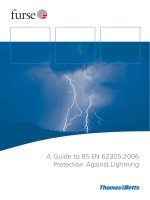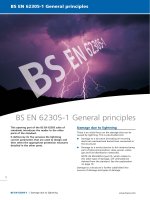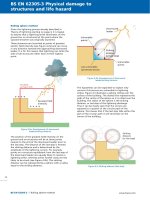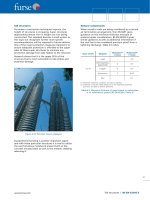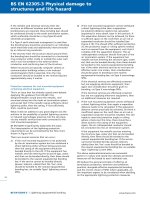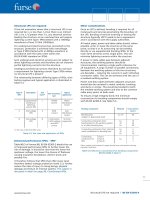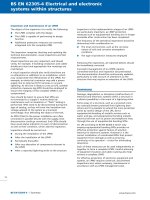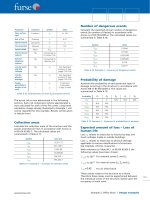Bsi bs en 00722 1 2004
Bạn đang xem bản rút gọn của tài liệu. Xem và tải ngay bản đầy đủ của tài liệu tại đây (461.52 KB, 12 trang )
BS EN
722-1:2004
BRITISH STANDARD
Leisure
accommodation
vehicles — Liquid fuel
heating systems —
Part 1: Caravans and caravan holiday
homes
The European Standard EN 722-1:2004 has the status of a
British Standard
ICS 43.100
?? ? ?????? ????? ?? ??? ?? ???????? ? ?? ? ?? ?? ?? ?????? ? ?? ? ???????? ???
?
?
?
?
?
?
?
?
?
?
BS EN 722-1:2004
National foreword
This British Standard is the official English language version of
EN 722-1:2004. It supersedes BS EN 722-1:1996 which is withdrawn.
The UK participation in its preparation was entrusted to Technical Committee
B/511, Buildings, mobile and temporary, which has the responsibility to:
—
aid enquirers to understand the text;
—
present to the responsible international/European committee any
enquiries on the interpretation, or proposals for change, and keep the
UK interests informed;
monitor related international and European developments and
promulgate them in the UK.
—
A list of organizations represented on this committee can be obtained on
request to its secretary.
Cross-references
The British Standards which implement international or European
publications referred to in this document may be found in the BSI Catalogue
under the section entitled “International Standards Correspondence Index”, or
by using the “Search” facility of the BSI Electronic Catalogue or of British
Standards Online.
This publication does not purport to include all the necessary provisions of a
contract. Users are responsible for its correct application.
Compliance with a British Standard does not of itself confer immunity
from legal obligations.
Summary of pages
This document comprises a front cover, an inside front cover, the EN title page,
pages 2 to 9 and a back cover.
The BSI copyright notice displayed in this document indicates when the
document was last issued.
This British Standard was
published under the authority
of the Standards Policy and
Strategy Committee
on 23 June 2005
© BSI 23 June 2005
ISBN 0 580 46161 0
Amendments issued since publication
Amd. No.
Date
Comments
EN 722-1
EUROPEAN STANDARD
NORME EUROPÉENNE
EUROPÄISCHE NORM
September 2004
ICS 43.1 00
Supersedes EN 722-1 :1 996
English version
Leisure accommodation vehicles - Liquid fuel heating systems Part 1 : Caravans and caravan holiday homes
Véhicules habitables de loisirs - Systèmes de chauffage à
combustibles liquides - Partie 1 : Caravanes et résidences
mobiles
Bewohnbare Freizeitfahrzeuge - Mit flüssigem Brennstoff
betriebene Heizungssysteme - Teil 1 : Caravans und
Mobilheime
This European Standard was approved by CEN on 9 July 2004.
CEN members are bound to comply with the CEN/CENELEC Internal Regulations which stipulate the conditions for giving this European
Standard the status of a national standard without any alteration. Up-to-date lists and bibliographical references concerning such national
standards may be obtained on application to the Central Secretariat or to any CEN member.
This European Standard exists in three official versions (English, French, German). A version in any other language made by translation
under the responsibility of a CEN member into its own language and notified to the Central Secretariat has the same status as the official
versions.
CEN members are the national standards bodies of Austria, Belgium, Cyprus, Czech Republic, Denmark, Estonia, Finland, France,
Germany, Greece, Hungary, Iceland, Ireland, Italy, Latvia, Lithuania, Luxembourg, Malta, Netherlands, Norway, Poland, Portugal, Slovakia,
Slovenia, Spain, Sweden, Switzerland and United Kingdom.
EUROPEAN COMMITTEE FOR STANDARDIZATION
COMITÉ EUROPÉEN DE NORMALIS ATION
EUROPÄIS CHES KOMITEE FÜR NORMUNG
Management Centre: rue de Stassart, 36 B-1 050 Brussels
© 2004 CEN
All rights of exploitation in any form and by any means reserved
worldwide for CEN national Members.
Ref. No. EN 722-1 :2004: E
EN 722-1 :2004 (E)
Contents
Page
Foreword ............................................................................................................................................................. 3
1
Scope...................................................................................................................................................... 4
2
Normative references ........................................................................................................................... 4
3
Terms and definitions........................................................................................................................... 4
4
Requirements ........................................................................................................................................ 4
4.1
General ................................................................................................................................................... 4
4.2
Oil tanks ................................................................................................................................................. 4
4.2.1 Location ................................................................................................................................................. 4
4.2.2 Stopcock ................................................................................................................................................ 4
4.2.3 Capacity ................................................................................................................................................. 4
4.2.4 Spillage .................................................................................................................................................. 5
4.3
Heating appliances ............................................................................................................................... 5
4.3.1 Types and installation .......................................................................................................................... 5
4.3.2 Products of combustion ....................................................................................................................... 5
4.3.3 Accessibility .......................................................................................................................................... 7
4.4
Fuel pipes .............................................................................................................................................. 7
4.4.1 General ................................................................................................................................................... 7
4.4.2 Materials................................................................................................................................................. 7
4.4.3 Corrosion protection ............................................................................................................................ 7
4.4.4 Joints...................................................................................................................................................... 7
4.4.5 Mechanical protection .......................................................................................................................... 7
4.5
Flues ....................................................................................................................................................... 7
4.5.1 Flue pipes .............................................................................................................................................. 7
4.5.2 Weather protection ............................................................................................................................... 7
4.5.3 Draught diverters and dampers for caravan holiday homes............................................................ 7
4.5.4 Accessibility .......................................................................................................................................... 8
4.6
Fire valve................................................................................................................................................ 8
5
User's handbook ................................................................................................................................... 8
Bibliography ....................................................................................................................................................... 9
2
EN 722-1 :2004 (E)
Foreword
This document (EN 722-1 :2004) has been prepared by Technical Committee CEN/TC 245 " Leisure
accommodation vehicles", the secretariat of which is held by BSI.
This European Standard shall be given the status of a national standard, either by publication of an
identical text or by endorsement, at the latest by March 2005, and conflicting national standards shall
be withdrawn at the latest by March 2005.
This document supersedes EN 722-1 :1 996.
According to the CEN/CENELEC Internal Regulations, the national standards organizations of the
following countries are bound to implement this European Standard: Austria, Belgium, Cyprus, Czech
Republic, Denmark, Estonia, Finland, France, Germany, Greece, Hungary, Iceland, Ireland, Italy,
Latvia, Lithuania, Luxembourg, Malta, Netherlands, Norway, Poland, Portugal, Slovakia, Slovenia,
Spain, Sweden, Switzerland and United Kingdom.
3
EN 722-1 :2004 (E)
1
Scope
This document specifies safety requirements for installing oil-fired heating systems in caravans and
caravan holiday homes. It applies to liquid fuel heating systems using oil fuels as defined in EN 1 3878.
NOTE
Safety ventilation requirements for leisure accommodation vehicles are specified in EN 721 .
2 Normative references
The following referenced documents are indispensable for the application of this document. For dated
references, only the edition cited applies. For undated references, the latest edition of the referenced
document (including any amendments) applies.
EN 1 3878:2003, Leisure accommodation vehicles — Terms and definitions
3 Terms and definitions
For the purposes of this document, the terms and definitions given in EN 1 3878:2003 apply.
4 Requirements
4.1 General
The installation of liquid fuel heating systems shall be carried out in accordance with the instructions
of the manufacturers of the equipment and appliances.
The system shall not leak when installed and shall be operated in accordance with the instructions of
the manufacturer.
The components of the system shall be of material suitable for use with liquid fuels.
4.2 Oil tanks
4.2.1
Location
Oil tanks shall be located so as to permit filling and draining from outside and if separate from the
heating appliance shall be placed in a fuel storage compartment or fuel storage housing. This
compartment or housing shall be ventilated to the outside of the leisure accommodation vehicle and
an opening shall be provided at the bottom to permit the drainage of water to the outside of the leisure
accommodation vehicle.
4.2.2 Stopcock
A stopcock shall be provided at the outlet of each tank. It shall be readily accessible.
4.2.3 Capacity
The capacity of the tank for the installation shall not exceed 50 l for caravans and 200 l for caravan
holiday homes.
4
EN 722-1 :2004 (E)
4.2.4 Spillage
Provision shall be made to ensure that, in the event of spillage when filling the tank, fuel shall not be
dispersed inside or below the leisure accommodation vehicle, whether the tank is integral with an
appliance or not.
4.3 Heating appliances
4.3.1
Types and installation
For caravans, only room-sealed appliances shall be used.
For caravan holiday homes, heating appliances which draw their combustion air from inside the
leisure accommodation vehicle, are permitted.
All heating appliances shall be securely fixed. Provision shall be made to protect any combustible
material adjacent to any heat-generating appliance in accordance with the heating appliance
manufacturer's instructions.
4.3.2 Products of combustion
All heating appliances shall be installed in such a way that the products of combustion shall be ducted
to the outside of the leisure accommodation vehicle. Combustion products shall not be evacuated
under the leisure accommodation vehicle.
Flue terminals shall be sited in accordance with the heating appliance manufacturer's instructions,
preferably on the roof or in the wall of the vehicle.
NOTE
It is recommended that flue terminals be positioned so that wind turbulence will not affect proper
operation.
Flue terminals shall not be positioned within 500 mm of a refuelling point of fuel tank breather outlet or
any ventilator from a liquid fuel system(s).
Flue terminals positioned on a wall or a roof for heating appliances shall not be fitted within 300 mm of
a ventilator for the habitation area (see Figure 1 ) or an opening part of a window (see Figure 2).
Where the flue terminal of a heating appliance is positioned vertically below an opening part of a
window, the heating appliance shall be fitted with an automatic shut-off device to prevent operation
when the window is open.
5
EN 722-1 :2004 (E)
Key
1
Ventilator
2
Prohibited zone
l = 300 mm
Figure 1 — Prohibited zone for discharge openings for the products of combustion in relation
to ventilators
Key
1
Window
2
Prohibited zone
3
Floor
l = 300 mm
Figure 2 — Prohibited zone for discharge openings for the products of combustion in relation
to windows
6
EN 722-1 :2004 (E)
4.3.3 Accessibility
Every appliance shall be accessible for inspection, service, repair or replacement.
4.4 Fuel pipes
4.4.1
General
The bore of piping shall not be significantly restricted either through bending or cutting. There shall be
no contact between the piping and electrical cables.
4.4.2 Materials
Pipework shall be of seam-welded steel or of seamless steel, stainless steel or copper or any
materials recommended by the appliance manufacturer.
4.4.3 Corrosion protection
Pipes which are in contact with material likely to cause corrosion, shall be protected throughout the
area of contact. In places exposed to corrosion, especially underneath the vehicle and in ducts, pipes
shall be protected by anti-corrosion measures, e.g. plastic coating or bituminous paintwork, or be of
corrosion resistant material.
4.4.4 Joints
Connections shall be made by flat-faced washered joints or compression joints. Soft soldered joints
shall not be used. Joints shall be accessible and secured so that they are not affected by vibration.
4.4.5 Mechanical protection
Pipework shall be protected against mechanical damage, either by its location or by grommets or
other means, where necessary.
4.5 Flues
4.5.1
Flue pipes
Flue pipes shall be sealed to prevent the products of combustion entering the leisure accommodation
vehicle and shall be constructed of non-combustible material, which shall be compatible with the
characteristics of the appliance and the manufacturer's installation instructions. Flue pipes shall
remain firmly in position particularly in the case of leisure accommodation vehicles in motion.
4.5.2 Weather protection
Where a flue pipe passes through a wall or roof, measures shall be taken to prevent ingress of water.
The flue terminal shall be fitted with a weather cap, so designed as not to obstruct the emission of flue
gases.
4.5.3 Draught diverters and dampers for caravan holiday homes
When a draught diverter is fitted, it shall be integral with a heating appliance or immediately adjacent
to it. No additional draught diverter or damper that restricts the area of a flue shall be fitted.
7
EN 722-1 :2004 (E)
4.5.4 Accessibility
Means shall be provided to allow periodic inspection of the whole of the circumference and length of
uninsulated flue pipes, the flue ends and attachments and the whole of the outside of the insulating
sleeve of insulated flue pipes. Panels or structure shall be removable by means of a simple tool such
as a screwdriver. It shall be permissible to carry out an inspection by the use of a hand-held mirror or
by feel as an acceptable alternative to direct visual inspection.
4.6 Fire valve
A thermally operated fire valve shall be fitted as an integral part of the installation to shut off the fuel
supply should overheating occur.
5 User's handbook
The leisure accommodation vehicle's manufacturer shall provide instructions for the correct operation
and maintenance of the system, which shall be provided as part of the User's handbook, worded at
least in the language of the country where the leisure accommodation vehicle is first sold. These
instructions shall clearly state the specification of fuel for which the system has been designed and,
where applicable, whether the system is suitable for use while the caravan is in motion.
8
EN 722-1 :2004 (E)
Bibliography
[1 ]
EN 721 , Leisure accommodation vehicles — Safety ventilation requirements
9
BS EN
722-1:2004
BSI — British Standards Institution
BSI is the independent national body responsible for preparing
British Standards. It presents the UK view on standards in Europe and at the
international level. It is incorporated by Royal Charter.
Revisions
British Standards are updated by amendment or revision. Users of
British Standards should make sure that they possess the latest amendments or
editions.
It is the constant aim of BSI to improve the quality of our products and services.
We would be grateful if anyone finding an inaccuracy or ambiguity while using
this British Standard would inform the Secretary of the technical committee
responsible, the identity of which can be found on the inside front cover.
Tel: +44 (0)20 8996 9000. Fax: +44 (0)20 8996 7400.
BSI offers members an individual updating service called PLUS which ensures
that subscribers automatically receive the latest editions of standards.
Buying standards
Orders for all BSI, international and foreign standards publications should be
addressed to Customer Services. Tel: +44 (0)20 8996 9001.
Fax: +44 (0)20 8996 7001. Email: Standards are also
available from the BSI website at .
In response to orders for international standards, it is BSI policy to supply the
BSI implementation of those that have been published as British Standards,
unless otherwise requested.
Information on standards
BSI provides a wide range of information on national, European and
international standards through its Library and its Technical Help to Exporters
Service. Various BSI electronic information services are also available which give
details on all its products and services. Contact the Information Centre.
Tel: +44 (0)20 8996 7111. Fax: +44 (0)20 8996 7048. Email:
Subscribing members of BSI are kept up to date with standards developments
and receive substantial discounts on the purchase price of standards. For details
of these and other benefits contact Membership Administration.
Tel: +44 (0)20 8996 7002. Fax: +44 (0)20 8996 7001.
Email:
Information regarding online access to British Standards via British Standards
Online can be found at />Further information about BSI is available on the BSI website at
.
Copyright
BSI
389 Chiswick High Road
London
W4 4AL
Copyright subsists in all BSI publications. BSI also holds the copyright, in the
UK, of the publications of the international standardization bodies. Except as
permitted under the Copyright, Designs and Patents Act 1988 no extract may be
reproduced, stored in a retrieval system or transmitted in any form or by any
means – electronic, photocopying, recording or otherwise – without prior written
permission from BSI.
This does not preclude the free use, in the course of implementing the standard,
of necessary details such as symbols, and size, type or grade designations. If these
details are to be used for any other purpose than implementation then the prior
written permission of BSI must be obtained.
Details and advice can be obtained from the Copyright & Licensing Manager.
Tel: +44 (0)20 8996 7070. Fax: +44 (0)20 8996 7553.
Email:

